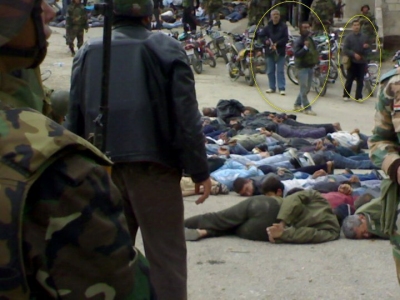Oral intervention by the International Federation for Human Rights FIDH the Cairo Institute for Human Rights Studies CIHRS and the Damascus Center for Human Rights Studies DCHRS
16th Special Session of the Human Rights Council “on the situation of human rights in the Syrian Arab Republic”. Intervention of Radwan Ziadeh > Damascus Center for Human Rights Studies.
Dear Respected Ambassadors and Representatives,
While I am speaking to you here in Geneva as a Syrian first, and as a human rights activist second, my fellow Syrians are demonstrating in most of the cities across the country, and this despite the use of live ammunition against them which has led to the death of more than 700 citizens, hundreds of missing and wounded, and thousands of detainees under the risk of torture.
And yet they are still peacefully protesting against one of the most repressive regimes in the region, but at the same time they are looking to us here, at the UN Human Rights Council (HRC), and hoping that the international community will help them in their peaceful and legitimate struggle.They are fully aware that the council cannot return the lives of their fallen loved-ones but at least can put an end to the use of force and violence by the Security services, who are immune from accountability according to Syrian law.
Ladies and Gentleman
I will not read here the hundreds of messages and emails I received yesterday from the people inside Syria when they knew that I would address your respected council, but I will read an excerpt from one “if the council doesn’t support the idea of an international inquiry … our blood will be forgotten again”, 30 years after the Asad regime committed the Hama massacre in 1982 we are still talking about the estimated number of people killed there ( some say 20000, others say 25000) after thirty years we still talk about “estimates” not “exact” numbers, because the regime didn`t take even a single step to open an investigation, how can we trust or believe now that this regime will open even an internal credible investigation into the killing of peaceful protesters since March 18, 2011.
The International Community should now take the responsibility for the Syrian victims who died for requesting their freedom back, Freedom is the most pronounced word in Syria today but it is also the most dangerous one, it cost the lives of more than 700 people, 650 of whom were less than 40 years old.
The Syrian troops have been besieging Daraa for almost five days. Access to food, water and medical assistance are strictly prevented. Electricity, means of communication and roads to the city are cut. These practices amount to collective punishment and constitute a serious threat for the population which is facing a humanitarian crisis. The official justification of fighting extremists is a dangerous lure. And even if this were the case the government shouldn’t stop food and medical supplies from entering the city thus punishing the whole population of Daraa. Yesterday the son of member of the Syrian Parliament was crying while he was talking to the B.B.C, he added “ we only need children`s milk”.
It has become obvious that international crimes are being perpetrated by the Syrian authorities and the International community urgently needs to wake up to this and act.
The gap between the official stance claiming the adoption of long awaited reforms including the lift of the state of emergency and the issuing of a law on peaceful demonstrations, and the systematic and violent repression on the ground, is more blatant than ever. The Council must strongly condemn the gross and systematic violation of human rights by the Syrian authorities and urge them to put an immediate end to the violence. An independent international commission of inquiry must also be urgently set up in order to investigate all alleged violations of international human rights law and identify the alleged perpetrators. Those responsible should be brought to justice. This is the only way to enable the Syrian people to believe that here is an international institution set up and able to protect their Human Rights.
Finally, violent crackdown against protesters by the army and security forces is not a Syrian exception. Bahrain and Yemen are also the scene of fierce repressions. However Bahraini and Yemeni victims are still waiting for the consideration of the International Community and the UN Human Rights council in particular. A selective approach cannot be a sustainable solution in any case.
Radwan Ziadeh
Damascus Center for Human Rights Studies
Share this Post

